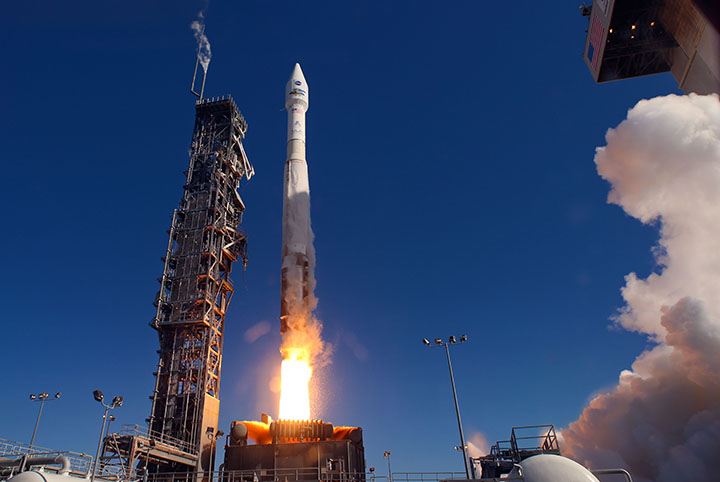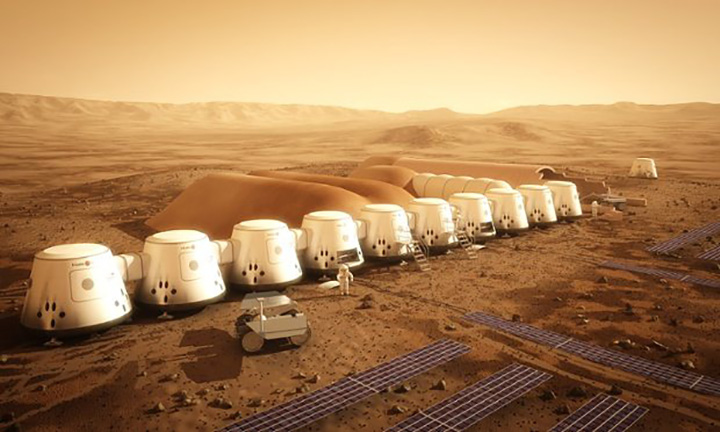Are We Witnessing the Birth of a New Space Race?

“I’m convinced that the first person to step foot on Mars will arrive there riding in a Boeing rocket”
This was the bold statement of Dennis Muilenburg, Boeing’s Chairman, President and CEO during the WHAT’S NEXT? event sponsored by The Atlantic magazine which was helpd in Chicago in the 4th and 5th of October.
In a 30 minute interview conducted by John Donvan, Muilenburg talked about his roots, how Boeing got to be a hundred years old and what the future has in store for his company. In a part where he was talking about Boeing’s future endeavours, Muilenburg mentioned deep space travel along with space tourism and environmentally sound sub-sonic travel.
Of course, all eyes are currently on Mars and Dennis Muilenburg’s are no different. During the interview, he pointed out NASA’s renewed efforts to explore the red planet, adding that he is convinced the first person to get there will be riding a Boeing rocket.
While not directly stated, a lot of people took this statement as a response to SpaceX co-founder and CEO Elon Musk’s recent announcement of his company’s plans to get people to Mars and ultimately start Space colonization.
Elon Musk, however has previously stated that he thinks that having multiple companies and organizations vying for interplanetary travel is a good thing. During his talk last September 27th, Musk said “I think it’s good for there to be multiple paths to Mars … to have multiple irons in the fire,”
All these recent announcements about interplanetary travel and even space colonization seem to have rekindled the public’s imagination. The private sector’s increasing efforts to explore the final frontier is sparking new interest from the public. All the recent talk from the big names in private space technology begs the question; Are we witnessing the birth of a new space race?

A Private Space Race?
History has taught us that competition can jumpstart exploration and put it into overdrive. Not so long ago, the world witnessed the first Space Race between the United States and the Union of Soviet Socialist Republics (USSR). In the span of a few decades, competition drove the development space technology and science and technology in general. During that time, the price was the moon, which was grabbed by the US when they successfully landed Apollo 11.
However, the Space Race had a darker face. When viewed in its entirety, it cannot be denied that the leaps and bounds made by both nations during the time were not done in the name of science and the love of exploration alone. The Space Race was merely another theatre of the Cold War. During this time, space technology was being developed side by side with weapons technology; with each of the two rival nations building satellites on one hand, and Intercontinental Ballistic Missiles on the other.
Back then, the reasoning behind the obsession with space travel was quite simple; anyone who can send a spacecraft to the moon can also send a rocket across the Atlantic. Because of this, the development of space travel technology became a necessity and had a looming sense of urgency.
Fortunately, the world has moved on from the Zero-Sum Mutually Assured Destruction doctrine. The final decades of the 20th century saw the collapse of Soviet Russia and the end of the Cold War. Unfortunately, with it came a lull in space exploration. With no competition to drive them, both sides gave less effort and funding to their space programs; eventually bringing the space race to a screeching halt.
The first decade of the 21st century saw the arrival of a new player. Private companies, some of which are seasoned government contractors, began to take a more active role in space exploration. Space Exploration Technologies Corporation or SpaceX, which today is in the forefront of space technology, was founded in 2002. SpaceX went on to become one of NASA’s leading private contractors; lending a hand in various programs including the International Space Station or ISS.
SpaceX’s continues success allowed its co-founder and CEO Ellon Musk to dream up bigger goals and bigger plans for his company. Musk’s recent announcement to get to Mars by 2022 seems to be sparking a renewed interest in space exploration. Already, his plans of Mars travel and colonization is making ripples in both the scientific and business community.